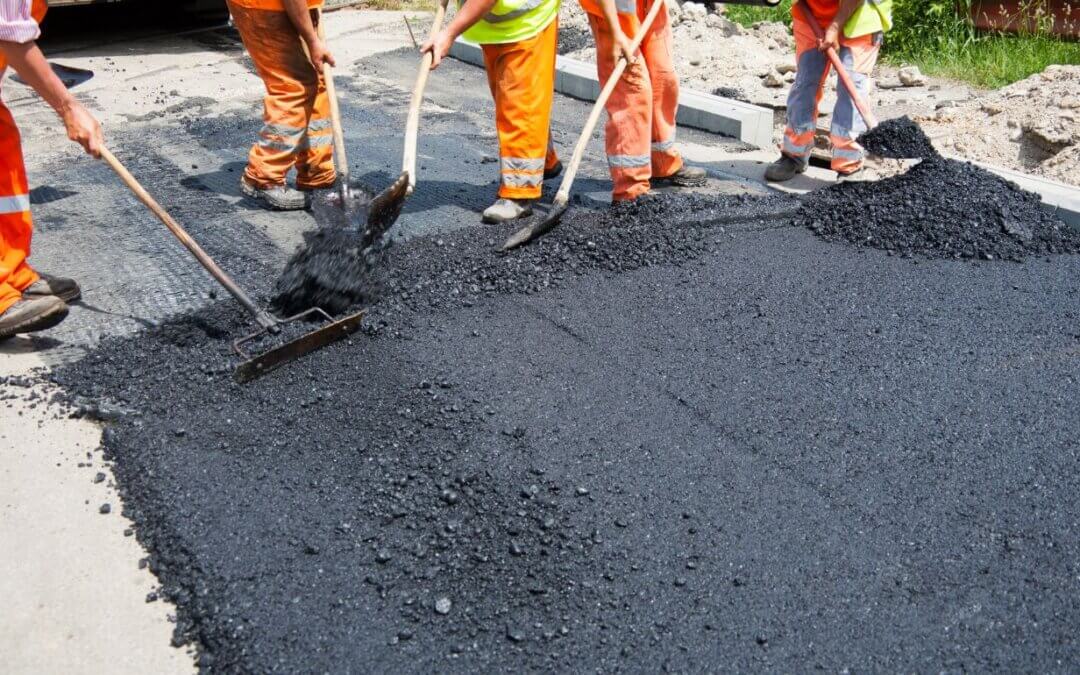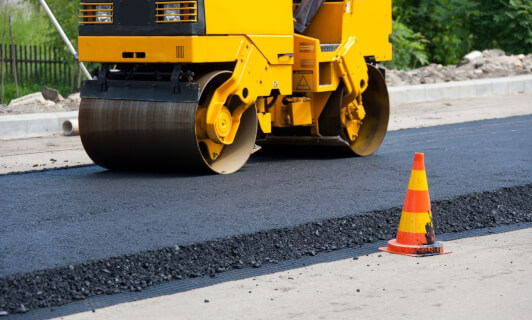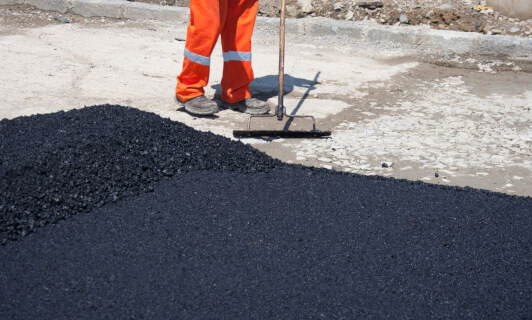The Importance of Resilient Road Infrastructure
Roads, the pivotal arteries of transportation, significantly influence the growth and operation of cities and communities, necessitating a focus on robust infrastructure. Implementing resilient road strategies, particularly when infused with Asphalt Paving, is imperative to manage the demands of heavy traffic, diverse weather conditions, and additional external challenges.
Ensuring resilience in road infrastructure is pivotal for maintaining consistent and smooth traffic flow, reducing disruptions, and bolstering safety for motorists and pedestrians alike. It plays a protective role against the damage from escalating natural disasters – floods, earthquakes, and severe weather events, particularly amidst the current climate change scenario. Further, resilient road infrastructure curtails maintenance costs over time, proficiently managing the wear and tear induced by heavy vehicles and hostile weather patterns. In summary, an investment in resilient road infrastructure, backed by insightful asphalt paving practices, serves as an essential commitment to not only the present but also secures the sustainability of our future transportation networks.
• Resilient road infrastructure ensures the smooth and uninterrupted flow of traffic
• It minimizes disruptions and enhances safety for motorists and pedestrians
• Resilience helps prevent damage from natural disasters such as floods, earthquakes, and extreme weather events
• It reduces maintenance costs in the long run by withstanding wear and tear caused by heavy vehicles and adverse weather conditions
• Investing in resilient road infrastructure is essential for the present and sustainable future of transportation systems.
The Role of Asphalt Paving in Ensuring Resilience
Asphalt paving plays a crucial role in ensuring the resilience of road infrastructure. The use of asphalt as a paving material offers several advantages that contribute to the durability and longevity of roads. Firstly, asphalt is a flexible material that can withstand heavy traffic loads and varying weather conditions. It has the ability to expand and contract with temperature changes, reducing the risk of cracking and structural damage. Furthermore, the smooth surface of asphalt pavement provides better driving conditions, minimizing wear and tear on vehicles and ensuring a safer and more comfortable ride for motorists. Overall, asphalt paving plays a pivotal role in enhancing the resilience of road infrastructure by providing a durable and reliable surface that can withstand the challenges of daily use and environmental factors.
Understanding the Challenges Faced by Hanover PA’s Road Infrastructure
The road infrastructure in Hanover PA faces numerous challenges that hinder its functionality and resilience. One of the major challenges is the heavy traffic flow, especially during peak hours. This immensely affects the roads’ durability and leads to increased wear and tear, resulting in frequent repairs and maintenance. Additionally, the increasing population and urbanization in the area contribute to the congestion on the roads, putting additional stress on the infrastructure. These challenges demand a comprehensive understanding of the specific issues faced by Hanover PA’s road infrastructure to develop effective solutions for ensuring long-lasting and resilient roads.
Another challenge is the harsh weather conditions experienced in the region. Hanover PA, like many other places, goes through extreme weather patterns. The significant temperature fluctuations, from freezing winters to hot summers, greatly impact the road surfaces. The constant expansion and contraction caused by these temperature changes contribute to cracks and potholes in the pavement. Moreover, heavy rainfall and snowfall can lead to water seepage into the road structure, weakening its foundation. The combination of heavy traffic, changing weather conditions, and limited resources poses significant challenges for maintaining and enhancing the road infrastructure in Hanover PA.
Innovative Techniques for Asphalt Paving in Hanover PA
Innovative techniques for asphalt paving in Hanover PA have been instrumental in improving the resilience and longevity of road infrastructure in the area. One such technique is the use of warm mix asphalt (WMA). WMA is produced at lower temperatures compared to traditional hot mix asphalt, resulting in reduced energy consumption and greenhouse gas emissions during the manufacturing process. This not only makes it more environmentally friendly but also enhances the overall sustainability of the road construction industry.
Another innovative technique that has gained popularity in Hanover PA is the use of recycled materials in asphalt paving. Recycled asphalt pavement (RAP) is often used as a substitute for virgin aggregates, thereby reducing the need for new material extraction and decreasing waste. By incorporating RAP into the asphalt mix, road constructions in Hanover PA have not only reduced their environmental impact but have also seen cost savings. The use of recycled materials also enhances the overall durability and strength of the pavement, contributing to increased resilience against wear and tear.
The Significance of Proper Road Maintenance for Resilience
Proper road maintenance plays a crucial role in ensuring the resilience of road infrastructure. Regular maintenance not only keeps the roads in optimal condition but also helps to prevent potential dangers and extend their lifespan. Without adequate maintenance, roads are susceptible to deterioration, which can lead to increased accidents, traffic congestion, and costly repairs.
One of the key aspects of proper road maintenance is regular inspections. By conducting thorough inspections, any signs of wear and tear can be identified early on, allowing for timely repairs. This includes identifying cracks, potholes, uneven surfaces, and drainage issues. Addressing these problems promptly not only ensures the safety of motorists but also prevents minor issues from turning into major structural problems.
In addition to inspections, regular maintenance activities such as seal coating, crack sealing, and line striping are essential to preserve the quality of the road surface. These preventive measures protect the asphalt from damaging factors like water infiltration, sunlight exposure, and heavy traffic. By maintaining a smooth and well-marked road surface, road users can experience improved ride quality, reduced vehicle damage, and enhanced visibility, ultimately contributing to a safer and more resilient road network.
Factors That Affect the Longevity of Asphalt Roads in Hanover PA
Factors that affect the longevity of asphalt roads in Hanover PA are numerous and can greatly impact the lifespan of the pavement. One important factor is the quality of the asphalt material itself. In Hanover PA, it is crucial to ensure that the asphalt used for paving is of high quality and meets the required specifications. Inferior quality asphalt may result in premature cracking, rutting, and other forms of damage, reducing the lifespan of the road.
Additionally, the construction process also plays a significant role in the longevity of asphalt roads. Proper compaction techniques must be employed during paving to ensure a uniform and dense surface. Inadequate compaction can lead to the formation of voids and air pockets, which ultimately weaken the structure of the road. Similarly, attention must be given to the thickness of the asphalt layer, as thinner layers may wear out more quickly, compromising the overall durability of the road. Therefore, careful attention to construction techniques and practices is crucial to maximizing the lifespan of asphalt roads in Hanover PA.
The Role of Weather Conditions in Asphalt Paving and Resilience
Weather conditions play a crucial role in determining the longevity and resilience of asphalt pavements in Hanover PA. Extreme fluctuations in temperature, heavy rainfall, and freezing winters can all impact the overall condition of the road infrastructure. Hot weather can cause the asphalt to soften and become more susceptible to deformation under heavy loads, while cold weather can lead to cracking and pothole formation. Additionally, prolonged exposure to intense UV rays can accelerate the aging process of the asphalt, leading to a decrease in its structural integrity.
Furthermore, rainfall can also significantly affect the performance of asphalt roads. Excessive water accumulation can weaken the road foundation, causing it to become unstable and prone to subsidence. This can result in the formation of potholes and other surface defects, making the road hazardous for motorists. Furthermore, the freeze-thaw cycle during winter months can exacerbate these issues, as water trapped within the pavement expands and contracts with temperature changes, causing further damage to the asphalt structure. Therefore, it is crucial for Hanover PA’s road infrastructure to be designed and constructed with weather conditions in mind, ensuring that they are sufficiently resilient to withstand such environmental factors.
Sustainable Practices for Asphalt Paving in Hanover PA
Sustainable practices play a critical role in ensuring the longevity and resilience of asphalt roads in Hanover PA. One such practice is the use of recycled materials in the asphalt mixture. By incorporating recycled asphalt pavement (RAP) and reclaimed asphalt shingles (RAS) into the mix, not only can the cost of construction be reduced, but also the environmental impact can be minimized. Furthermore, using RAP and RAS helps to conserve natural resources and reduces reliance on virgin materials.
Another sustainable practice for asphalt paving in Hanover PA is the implementation of warm-mix asphalt (WMA) technology. WMA allows for the reduction of asphalt production and compaction temperatures, resulting in lower energy consumption and greenhouse gas emissions. It also improves worker safety by reducing exposure to high temperatures during construction. Additionally, WMA has been found to provide equal or better pavement performance compared to traditional hot-mix asphalt, further emphasizing its sustainability benefits.
What is the importance of resilient road infrastructure?
Resilient road infrastructure is crucial for the smooth and safe movement of people and goods, as well as for economic development. It ensures that roads can withstand various stresses and recover quickly from any disruptions.
How does asphalt paving contribute to ensuring resilience?
Asphalt paving plays a vital role in ensuring resilience by providing a durable and flexible surface for roads. It absorbs shock and provides a smooth driving experience, minimizing wear and tear on vehicles and reducing the need for frequent repairs.
What are the challenges faced by Hanover PA’s road infrastructure?
Hanover PA’s road infrastructure faces challenges such as heavy traffic, harsh weather conditions, and aging pavement. These factors can lead to deterioration and require regular maintenance and repair.
Are there any innovative techniques for asphalt paving in Hanover PA?
Yes, there are innovative techniques available for asphalt paving in Hanover P
Why is proper road maintenance significant for resilience?
Proper road maintenance is essential for resilience as it helps identify and address issues promptly, preventing further damage and ensuring the longevity of the road infrastructure. Regular maintenance also minimizes disruptions caused by road repairs.
What factors affect the longevity of asphalt roads in Hanover PA?
Several factors can affect the longevity of asphalt roads in Hanover P
How do weather conditions impact asphalt paving and resilience?
Weather conditions, such as extreme temperatures, freeze-thaw cycles, and precipitation, can significantly impact asphalt paving and resilience. These conditions can cause cracks, potholes, and other forms of deterioration, emphasizing the need for proper planning and maintenance.
What are some sustainable practices for asphalt paving in Hanover PA?
Sustainable practices for asphalt paving in Hanover PA include using recycled materials in asphalt mixtures, implementing warm-mix asphalt technology, promoting proper drainage to prevent water damage, and incorporating permeable pavements to manage stormwater runoff.




